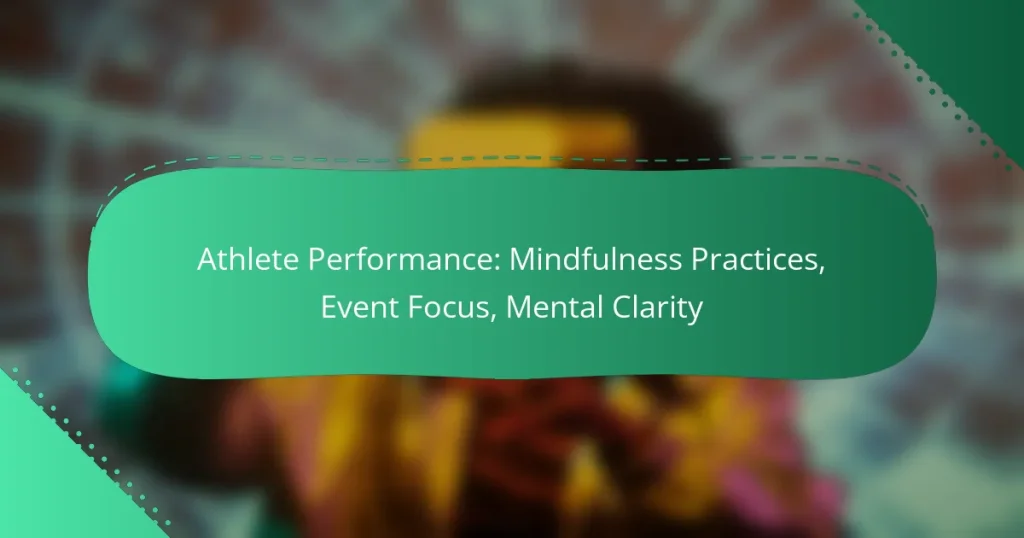Mindfulness practices play a crucial role in enhancing athlete performance by promoting mental clarity, focus, and emotional regulation. By integrating techniques that reduce anxiety and improve concentration, athletes can manage stress more effectively and maintain optimal performance levels during competitions.
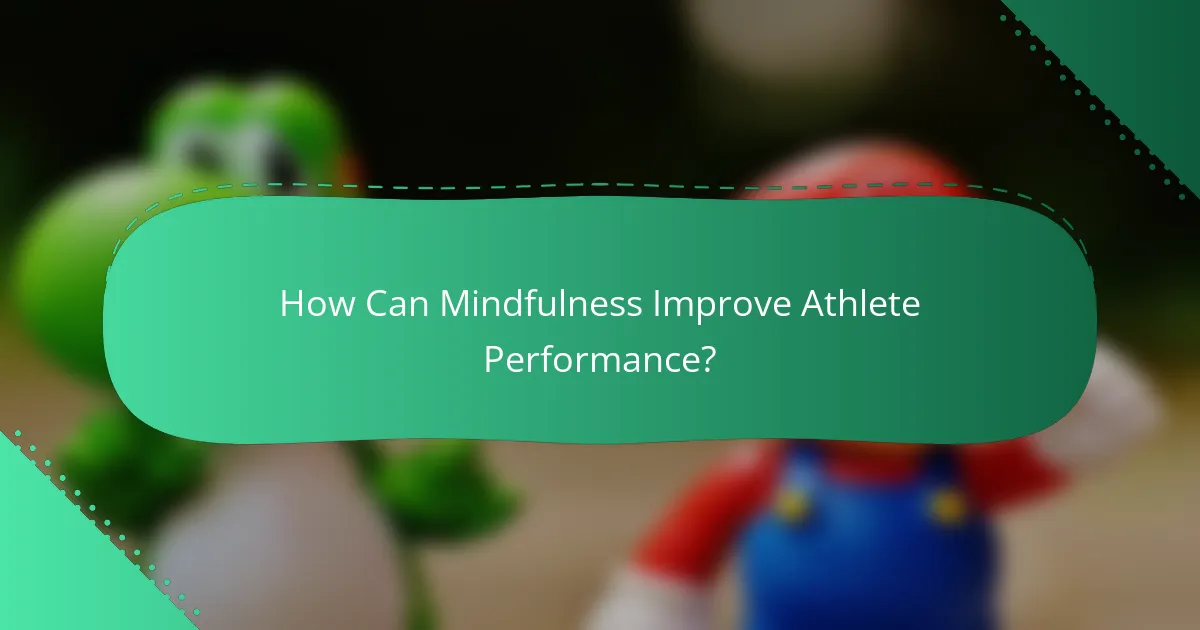
How Can Mindfulness Improve Athlete Performance?
Mindfulness can significantly enhance athlete performance by fostering greater mental clarity, focus, and emotional regulation. By incorporating mindfulness practices, athletes can better manage stress and improve their overall competitive edge.
Enhanced focus
Mindfulness practices, such as meditation and breathing exercises, can help athletes sharpen their concentration during training and competitions. By training the mind to stay present, athletes can minimize distractions and maintain a clear focus on their performance goals.
Techniques like visualization can also enhance focus. Athletes can mentally rehearse their routines, which prepares them to execute with precision during actual events. Regular practice can lead to improved performance consistency over time.
Reduced anxiety
Mindfulness is effective in reducing anxiety levels, which can be detrimental to athletic performance. By practicing mindfulness, athletes learn to recognize and manage their anxious thoughts, allowing them to remain calm under pressure.
Simple techniques such as deep breathing or grounding exercises can help athletes regain composure before a competition. This mental resilience can lead to a more relaxed state, enabling better decision-making and performance execution.
Improved recovery
Mindfulness can also facilitate better recovery by promoting relaxation and reducing stress. Athletes who engage in mindfulness practices often report improved sleep quality, which is crucial for physical recovery and overall performance enhancement.
Incorporating mindfulness into post-training routines, such as through guided meditation or gentle yoga, can help athletes recover more effectively. This holistic approach not only aids in physical recovery but also supports mental well-being, creating a balanced athlete.
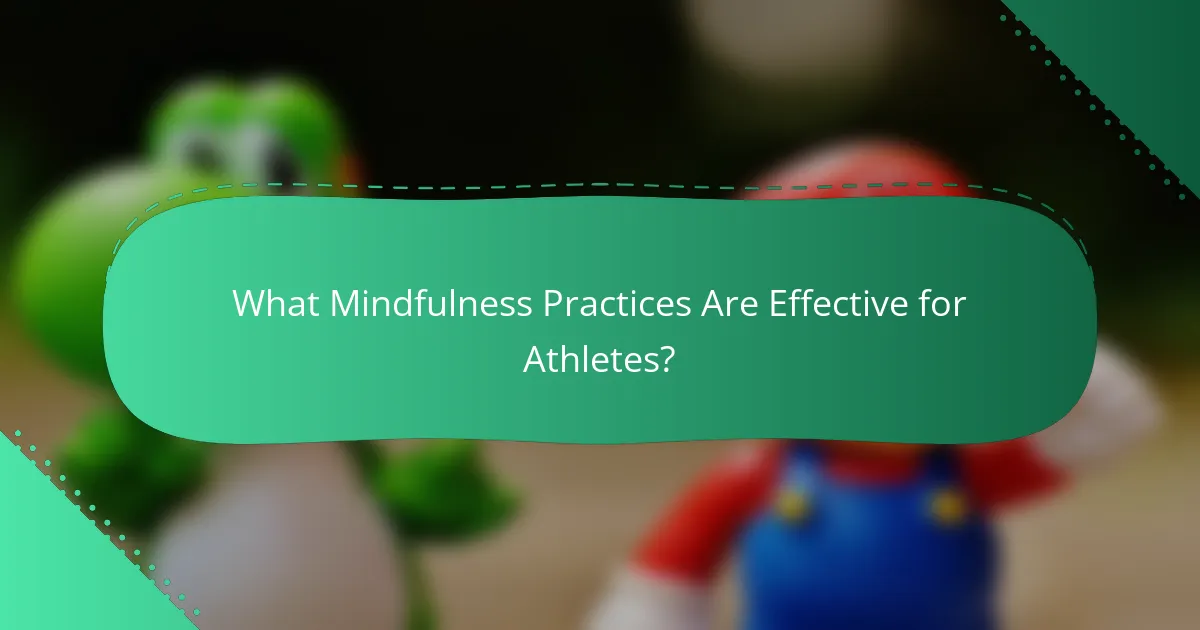
What Mindfulness Practices Are Effective for Athletes?
Effective mindfulness practices for athletes include techniques that enhance focus, reduce anxiety, and improve overall mental clarity. These practices can significantly impact performance by fostering a calm and concentrated mindset during competitions.
Meditation techniques
Meditation techniques such as focused attention and body scan can help athletes cultivate a deeper awareness of their thoughts and feelings. Focused attention meditation involves concentrating on a single point, like the breath, which can enhance concentration during events.
Body scan meditation encourages athletes to mentally check in with different parts of their body, promoting relaxation and reducing tension. Regular practice, even for just a few minutes daily, can lead to improved performance and resilience under pressure.
Breathing exercises
Breathing exercises are essential for managing stress and maintaining focus. Techniques like diaphragmatic breathing help athletes slow their heart rate and calm their minds, which is crucial before and during competitions.
One effective method is the 4-7-8 technique: inhale for 4 seconds, hold for 7 seconds, and exhale for 8 seconds. Practicing this for a few minutes can help athletes regain composure and clarity, especially in high-stakes situations.
Visualization strategies
Visualization strategies involve mentally rehearsing performance scenarios to enhance confidence and focus. Athletes can visualize themselves executing skills successfully, which can create a positive mindset and reduce performance anxiety.
To practice visualization, athletes should find a quiet space, close their eyes, and vividly imagine their performance, including sights, sounds, and feelings. Regular visualization sessions can improve mental readiness and increase the likelihood of achieving desired outcomes during competitions.
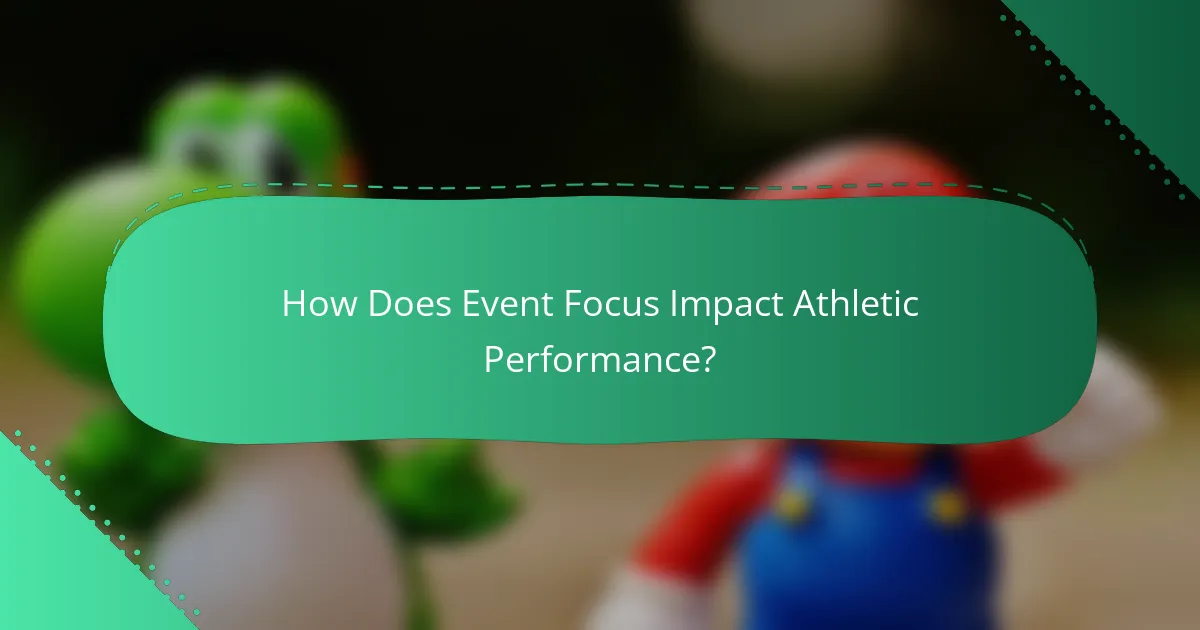
How Does Event Focus Impact Athletic Performance?
Event focus significantly enhances athletic performance by allowing athletes to concentrate on the task at hand, minimizing distractions. This mental clarity helps in executing skills effectively and maintaining optimal performance levels during competitions.
Increased concentration
Increased concentration is crucial for athletes, as it enables them to block out distractions and maintain focus on their performance. Techniques such as mindfulness meditation can help improve concentration by training the mind to stay present and engaged.
To enhance concentration, athletes can practice visualization techniques, where they mentally rehearse their performance, which can lead to improved execution during actual events. Setting specific, short-term focus points during training can also help in sharpening concentration skills.
Goal-setting methods
Effective goal-setting methods are essential for maintaining event focus and enhancing performance. Athletes should set SMART goals—Specific, Measurable, Achievable, Relevant, and Time-bound—to create clear objectives that guide their training and competition strategies.
For example, instead of a vague goal like “improve my speed,” an athlete might set a goal to “reduce my 100m sprint time by 0.5 seconds within three months.” Regularly reviewing and adjusting these goals can keep athletes motivated and focused on their performance outcomes.
Pre-event routines
Pre-event routines help athletes establish a mental state conducive to optimal performance. These routines can include physical warm-ups, mental visualization, and breathing exercises that promote relaxation and focus before competition.
A well-structured pre-event routine might involve a series of steps such as stretching, reviewing goals, and performing a specific breathing technique. Consistency in these routines can create a sense of familiarity and readiness, reducing anxiety and enhancing performance during the event.

What Role Does Mental Clarity Play in Sports?
Mental clarity is crucial in sports as it enhances an athlete’s focus, decision-making, and overall performance. Athletes with clear minds can better navigate challenges, maintain concentration, and execute strategies effectively during competitions.
Decision-making speed
Mental clarity significantly impacts decision-making speed in sports. Athletes who are mentally clear can process information quickly, allowing them to make split-second decisions during high-pressure situations. For instance, a soccer player must decide whether to pass, shoot, or dribble within moments, and clarity helps streamline that thought process.
To improve decision-making speed, athletes can practice mindfulness techniques, such as meditation or visualization, which enhance their ability to remain present and focused. Regularly simulating game scenarios can also help athletes train their minds to react faster under pressure.
Stress management
Mental clarity aids in effective stress management, which is vital for peak performance. Athletes who maintain a clear mind can better cope with the pressures of competition, reducing anxiety and enhancing their ability to perform. Techniques like deep breathing and positive self-talk can help athletes manage stress levels effectively.
Incorporating mindfulness practices into daily routines can foster resilience against stress. Athletes should identify their stress triggers and develop coping strategies, such as setting realistic goals and maintaining a balanced lifestyle, to mitigate the impact of stress on their performance.
Performance consistency
Consistency in performance is closely linked to mental clarity. Athletes who maintain a clear and focused mindset are more likely to replicate successful performances over time. This consistency can be achieved through routine mental training, which reinforces focus and reduces variability in performance outcomes.
To enhance performance consistency, athletes should establish pre-competition rituals that promote mental clarity, such as visualization or affirmations. Regularly reviewing past performances and identifying areas for improvement can also help athletes maintain a steady trajectory in their training and competitions.
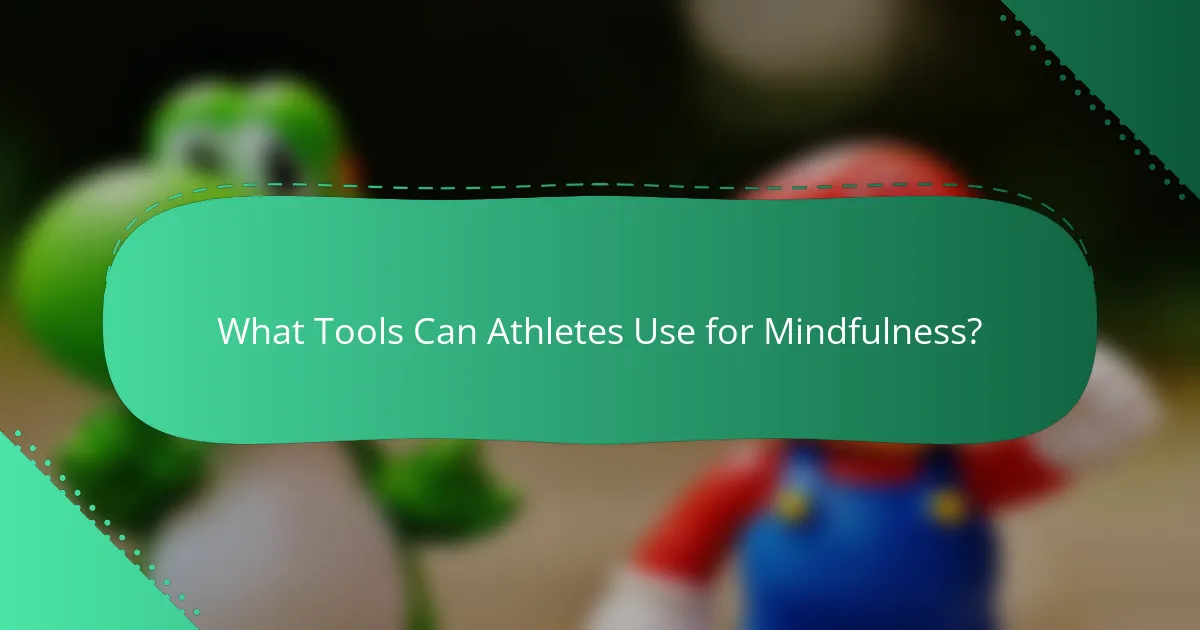
What Tools Can Athletes Use for Mindfulness?
Athletes can enhance their performance through various mindfulness tools that promote mental clarity and focus. These tools often include apps designed to facilitate meditation, breathing exercises, and relaxation techniques, helping athletes manage stress and improve concentration during events.
Headspace app
Headspace is a popular mindfulness app that offers guided meditations tailored for athletes. It includes specific programs aimed at enhancing focus, reducing anxiety, and improving overall mental well-being.
Users can choose from a variety of sessions ranging from a few minutes to longer practices, making it easy to fit mindfulness into a busy training schedule. The app also provides features like sleep aids and focus music, which can be beneficial for pre-event preparation.
Calm app
The Calm app focuses on meditation, sleep, and relaxation, making it a versatile tool for athletes. It offers guided sessions that help users develop mindfulness skills, which can be particularly useful for managing pre-competition nerves.
Calm includes a variety of resources such as breathing exercises and soothing soundscapes, allowing athletes to create a personalized mindfulness routine. The app’s user-friendly interface makes it accessible for individuals at any experience level.
Insight Timer
Insight Timer is a free meditation app that features a vast library of guided meditations and talks from mindfulness experts. Athletes can explore various topics, including performance enhancement and stress management, to find sessions that resonate with their needs.
The app also allows users to connect with a community of meditators, providing a sense of support and shared experience. With options for both short and long meditations, Insight Timer is adaptable for any athlete’s schedule.
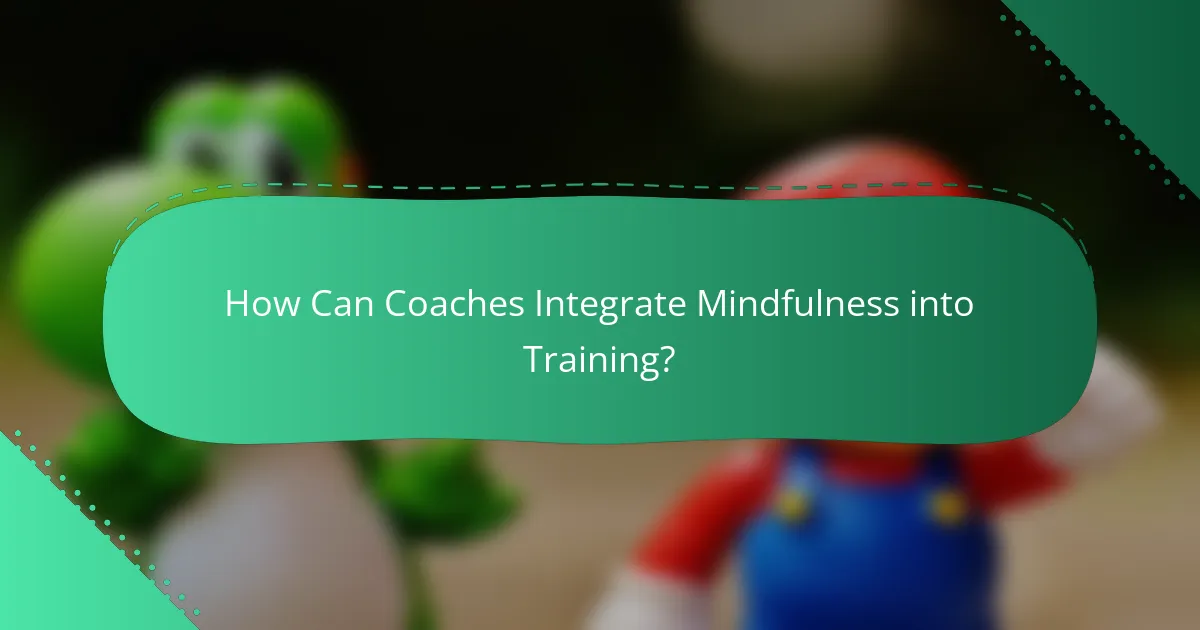
How Can Coaches Integrate Mindfulness into Training?
Coaches can integrate mindfulness into training by incorporating practices that enhance athletes’ focus and mental clarity. This can involve structured activities that promote awareness and presence, ultimately improving performance during competitions.
Workshops and seminars
Workshops and seminars are effective ways for coaches to introduce mindfulness concepts to athletes. These sessions can cover various techniques such as meditation, breathing exercises, and visualization strategies that athletes can use to enhance their mental resilience.
When planning workshops, consider including interactive elements like group discussions or guided mindfulness practices. This engagement helps athletes understand the practical applications of mindfulness in their training and competition settings.
Coaches should aim to schedule these workshops regularly, perhaps once a month, to reinforce mindfulness practices. Providing resources such as handouts or access to online materials can also support athletes in their mindfulness journey.
